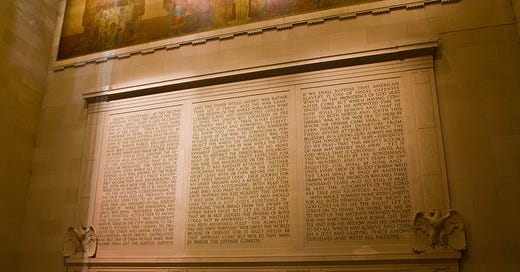Our House Divided
We are tending toward total government and cultural moral emptiness. Can we stop these trends? Will we?
Abraham Lincoln’s Gettysburg Address and Second Inaugural, forever etched in marble, are profound reflections on the human condition. From the chaos of the Civil War, Lincoln discerned purpose. He reminded us that as mere mortals—even in the throes of death and destruction—we can reach for something good, something beautiful, something important that transcends our brief time on Earth.

Lincoln’s House Divided Speech is different. While it lacks the sublime grandeur of his more famous utterances, it was, arguably, Lincoln’s only speech that truly changed the course of human events.
His House Divided Speech was more than meditation or observation: it was an important causal agent for the events that unfolded afterward, effectively dividing the Democratic Party, paving the way for the first Republican President of the United States, and presaging the secession crisis and the Civil War that ensued.
Lincoln’s House Divided Speech marked his acceptance of the Republican Party’s nomination to be the Republican candidate for the United States Senate seat from Illinois. On June 16, 1858, speaking before the Republican State Convention at the Illinois State Capitol in Springfield, Lincoln opened with a conditional hypothesis:
“If we could first know where we are and whither we are tending, we could better judge what to do and how to do it.”
Let us pause, pivot, and address Lincoln’s words to ourselves: With an important presidential election less than a month away, can there be anything more crucial right now than clarifying where we are, as a nation, and whither we are tending so that we can better judge what to do and how to do it?




